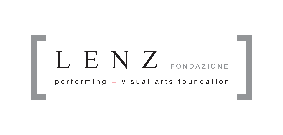
FRANCESCO PITITTO
![[cml_media_alt id='444']francescopititto[/cml_media_alt]](https://lenzfondazione.it/wp-content/uploads/2014/04/francescopititto.jpg)
In 1977, together with Giuseppe Ferrari, he translated into Italian Il cinema secondo Hitchcock by François Truffaut (Pratiche Editrice) which, in its various reprints, became a bestseller and a cult film publisher.
In 1982 he made cultural television programmes for Rai3, in particular a long interview with Luigi Magnani, art critic and collector.
In 1985 he founded, with Maria Federica Maestri, Lenz Rifrazioni, a theatre research company selected by the authoritative theatre critic and scholar Giuseppe Bartolucci.
In 1989 he won the prize Orizzonti Drammaturgia In-finita with the original text Although living on earth men are boats inspired by Vladimir Majakovskij.
From 1990 onwards, he has carried out multi-year projects, of which he is responsible for the dramaturgy, on the works of Friedrich Hölderlin up to the translation and creation of ANTIGONE by Hölderlin, never translated nor performed in Italy.
In 1997 he was awarded, together with Maria Federica Maestri, the Prize for Theatre Research by the National Association of Theatre Critics.
In 1999 the opera HAM-LET was invited by Luca Ronconi to the Festival del Teatro d’Europa del Piccolo Teatro in Milan and Guido Davico Bonino described its absolute originality in a television programme RAISAT.
In 2000 UR-FAUST was given its national premiere at the Teatro Farnese in Parma and began the rewriting and staging of Faust, which has been reported by critics as a three-year project of national importance (Renato Palazzi, Franco Cordelli, Titti Danese, Valeria Ottolenghi, Massimo Marino, Sebastiano Brizio, Gianni Manzella, Cristina Valenti and many other Italian theatre critics and scholars).
In 2002 the dramaturgical rewrites of Snow White and Cinderella by the Brothers Grimm, in Lenz’s stage translation, were invited to international festivals in Lille, Madrid, Cairo, Olot, Arles and Ivry. In the same year Little Red Riding Hood, whose translation, dramaturgy and direction he takes care of, inaugurates at the Duse Theatre in Bologna the 1st Festival of Social Interactions directed by Claudio Meldolesi and Franca Sivestri.
In 2004 the Calderonian operas La vita è sogno and Il Magico Prodigioso were invited to the most prestigious event of Spanish Baroque theatre, the Festival of Classical Theatre of Almagro in Spain.
At the beginning of 2006 he made a long trip with the company to Spain and Morocco to collect visual material useful for the imagoturgy and dramaturgy for the staging of Il Principe costante, whose European debut will take place in Alméria in March. On November 5, at Palazzo Marini in Rome, Lenz Rifrazioni receives the Aretê national award for the best responsible communication in the Italian theatre sector.
In 2009 he curated the dramaturgy and imagoturgy of Exilium, a new project realized for the final part in Romania and “diffused” in the urban scenery of some Romanian cities, inspired by Tristia and Epistulae ex Pontus, works of Ovid’s exile.
In 2010 he edited Dido’s dramaturgy and imagoturgy inspired by Ovid’s Epistulae Heroidum, directed by Maria Federica Maestri.
As part of the contemporary music festival Traiettorie curates in 2010 the dramaturgy and imagoturgy of Die Schachtel (La Scatola), a musical work by Franco Evangelisti performed by the ensemble Prometeo directed by Marco Angius, with the instrumental supervision of Salvatore Sciarrino.
In 2011 Daphne and I, are presented at the eighth edition of the Festival Escrita na paisagem, dedicated to the theme of myth in Evora (PT), as part of the project Embassy of the Italian Theatre in Portugal.
In 2012 he is in charge of the dramaturgy and imagoturgy of HAMLET’s third re-design at the Teatro Farnese in Parma. In 2014 he curated the dramaturgy and imagoturgy of ADELCHI, Lenz’s second work on Manzoni’s works after the monumental I PROMESSI SPOSSI, and the installation of the imagoturgies of the previous staging in the halls of the main floor of Palazzo Ducale in Parma.
He is responsible for the dramaturgy and direction of VERDI RE LEAR – L’OPERA CHE NON C’E’, from Shakespeare’s King Lear commissioned by the Verdi Festival; an opera never set to music but always loved by Verdi himself. The musical reworking is entrusted to Robin Rimbaud aka Scanner, one of the most prestigious composers of electronic music in the world.
In 2015 he curated the dramaturgy and imagoturgy of the site-specific project IL FURIOSO, by Lodovico Ariosto, which saw large installations at the Guatelli Museum, the Rasori Pavilion and the Temple of Cremation in Parma.
In 2016, KINDER’s dramaturgy and imagoturgy on the persecution of Jewish children in Parma in collaboration with the Ars Canto children’s choir and the Istituto Storico della Resistenza, the three-year project will continue in 2017 with AKTION T4 and ROSA WINKEL in 2018.
Again commissioned by the Festival Verdi 2016, he takes care of the dramaturgy and imagoturgy of AUTODAFE’ by Don Carlo di Giuseppe Verdi, an installation in the Napoleonic wing of the former prison of San Francesco di Parma.
In 2017 he curated dramaturgy and imatogurgy for PARADISO.UN PEZZO SACRO dai Quattro Pezzi Sacri by Verdi and Dante at Ponte Nord, PURGATORIO at the former Ospedale Vecchio in Parma and, in 2018, VERDI MACBETH by Verdi and Shakespeare.
Also in 2017 with IMPERIAL STAIRCASE, imagoturgy and live electronics in collaboration with Robin Rimbaud (Scanner) the Imperial Staircase of the renovated Complex was inaugurated and with QUESTA DEBOLE FORZA by Oedipus and Hölderlin, simultaneously with the performance of the Prometheus of Ninth, a site-specific, with live music by Claudio Rocchetti in the Hall of Roman Statues of the Archaeological Museum.
In 2018 starts the new three-year project for Parma Capitale della Cultura on Calderón de la Barca and debuts IL GRANDE TEATRO DEL MONDO at the Teatro Farnese in Parma and in 2019.
As part of the same project, in 2019 will debut LA VIDA ES SUEÑO in the spaces of the West Wing of the National Gallery, while in 2020 will debut the three solos ALTRO STATO, FLOWERS LIKE STARS? and HIPÓGRIFO VIOLENTO as part of the project IL PASSATO IMMINENTE for Parma Italian Capital of Culture 2020, which in June will end with LA VITA È SOGNO, great theological-philosophical drama that will be staged in the spaces of the Monumental Complex of the Pilotta.








